The Good, The Bad & The Ugly: Slimming Down Waste Post Lock-down
Posted on
During lockdown we’ve experienced The Good; more time to enjoy nature and the ‘great outdoors’ (the sweet sound of birdsong!), a sense of community, sharing and a resourcefulness not seen for decades, The Bad; a rise in plastic use and disposables such as masks and single use items like plastic glasses, cutlery, and condiment sachets. Last, but certainly not least, The Ugly; fly tipping and litter-bugging of epic proportions (the latter autocorrected to ‘jitter-bugging’ - if only :-)!).
In the Taylor household our waste levels have definitely crept up. In the early months we munched our way through more takeaways from local restaurants with whom we would normally dine in. Less frequent food shops, restricted to the local supermarket, has resulted in more food packaged in plastic. The kids in particular have contributed to an increase in online orders, and lets just say their favourite high street brands are not known for their sustainable packaging!
Whilst the fam may have quietly enjoyed my more laissez faire approach to plastic, which is in reality a symptom of my being distracted with simply getting through these weird times, it is time for me, and the nation, to reclaim the good habits, and discover some even better ones for reducing our plastic use. The Eco Geek Is Back (or as daughter Rose would say ‘fun over’).
1. The Weekly Shop
Current Habits:
-
A weekly delivery box from Riverford. All of the fruit and vegetables are organically grown, mostly in the UK, and the reusable box arrives with mostly loose produce.
-
Regular milk, fruit juice and yoghurt doorstep deliveries from Milk And More, with refillable and or recyclable glass packaging.
-
(A return to) regular trips to the local Refill shop (Refill Larder, Teddington), for dry goods such as nuts, seeds, pasta and rice, taking and using our own containers.
- Little or no packaging when using refill shops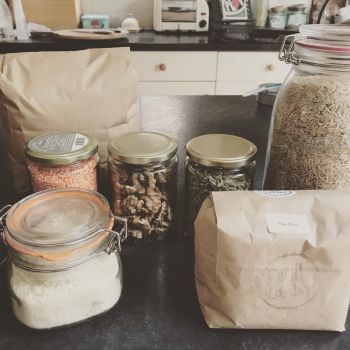
-
(A return to) taking our own containers for meat, fish and bread. As long as they are clean, there shouldn’t be any hygiene issues with providing your own container/ bag/ cup.
Goals For Improvement:
-
Switch to Riverford’s plastic free box, which they have recently introduced.
-
Expand our order with Milk’N’More, as they continue to increase their product range to include refillable household cleaning supplies, compostable coffee pods and many other sustainable products which are hard to find elsewhere. They also champion small, British suppliers with great ethics.
-
Use our new local community shop (at The Hub) for top up shops. They stock surplus and out of date food from supermarkets, thus saving huge amonts from landfill and providing free food for those that need it. The whole community is encouraged to use the shop, with those that can afford it making a contribution that goes towards charitable causes.
- First trip to local surplus store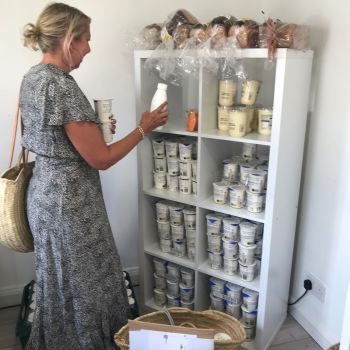
Other Options/Tips:
-
Purchase your dry goods from an online refill store like Plastic Free Pantry, or find a refill store local to you. New stores are popping up all of the time.
-
Sign up for the new Loop scheme, an initiative from Terracycle and Tesco which supplies branded products in (very smart) refillable containers. It's easy to order on line with free delivery, plus a small deposit for the containers. More products are being added all of the time.
"Loop was designed from the ground-up to reinvent the way we consume by learning from historic circular and sustainable models like the milkman from yesteryear while honouring the convenience afforded by our single use consumption of today," said Tom Szaky, founder and CEO of Loop and TerraCycle.”
-
When supermarket shopping, opt for loose foods where you can, and choose aluminium and glass over plastic packaging. Aluminium is the most efficient material to recycle - choose cans for foods like tomatoes, pulses, olives and fizzy drinks. Glass jars and bottles can be repurposed for storage and display (of things like flowers).
-
Use local grocer, bakers, butchers, fishmongers if you are lucky enough to have them! They may cost a little more than your supermarket, but the quality is generally much better, and you can take your own bags and containers.
2. Online Shopping
Current Habits:
-
I try to shop from companies that are ethical and use sustainable packaging, which I am able to reuse with The Wise House.
-
A goal that I have stuck with this year is to only buy one piece of clothing per quarter. It hasn’t been difficult at all, and is a real treat when you do buy that one piece. I did exclude underwear - not in terms of wearing it :-) but in terms of allowing myself to purchase where needed. I love my new set from Organic Basics!
-
Plastic envelopes are saved and placed in our Terracycle plastics box, which is a paid for box enabling us to recycle plastic packaging not taken by the curbside scheme (more on this below)
Goals For Improvement:
-
Return to the shops where we can do so safely, taking our own shopping bags.
-
Write to our favourite online stores requesting plastic free packaging. A polite comment on social media also works well. If enough of us do this, we may start to see changes in the way things are packaged.
-
Persuade the family to choose the more ethical brands where possible.
Other Options/Tips:
-
Smaller independent companies are more likely to use plastic free packaging, or at least to respond to requests for plastic free. Try marketplaces like Etsy or Folksy too.
-
Ask yourself whether you need to buy new, or could consider buying second hand from Ebay and the like. Packaging aside, buying second hand and reusing/ repurposing is always the most eco friendly option. Even better than that, ask your local community if they can share items like wallpaper steamer, strimmer, etc. Our street chat, created in lockdown, has become a great sharing resource for the neighbourhood.
- Our wonderful street book share stand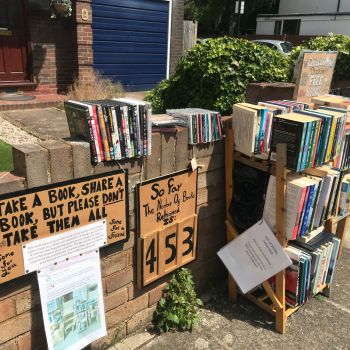
-
Stretchy plastic can be saved and placed in the plastic bag recycling points available at most supermarkets. In addition to envelopes; bread bags, cereal box liners, magazine covers - any stretchy plastic - can be included as long as it is clean and dry.
-
Consider offering larger packaging items to local businesses and charities to reuse. I have become a local recycling depot for boxes and paper packaging, which I use to pack orders.
3. Litter
I will caveat this section to say of course we shouldn’t have to pick up any litter other than our own, but the reality is that if we don’t, then who will? Or to put it another way, if we do it then other people might follow.
Current Habits:
-
Pick up the odd bit of litter on my daily dog walk when my hands are free and I have pockets.
Goals For Improvement:
-
Get the litter pickers out and go on a litter picking walk, complete with a bag in which to put the litter. Take a friend so that we can pick up double.
Other Options/Tips:
-
Speak to your (in particular) teenage children who are probably enjoying time outside in groups with their friends. Sometimes they are too busy wantonly enjoying life (remember those days?) and may need a nudge/ gentle reminder to put their litter in a bin or take it home with them.
A friend told me a story about a local lady down near Windsor, who goes down to the riverside with a few bin bags and gives them out to the groups of teens who are hanging out there. She asks them if they would like a bag for their rubbish and receives a positive response, with the result that the area is left much cleaner than it would have been. I love this collaborative approach!
4. Takeaways & Eating Out
Current Habits:
-
We take our own water bottles and bags with us wherever we go, including clothes shopping. I actually cringe at the sight of a shiny new carrier bag being given out at checkout.
-
If picnicking or eating on the go, we take reusable cups, cutlery, containers, beeswax wraps, bowl covers etc, so that we minimise the amount of waste we produce. We may still end up with the odd wrapper, but it is still a drastic reduction!
-
For beer or wine, we take our own stainless steel cups so that we can avoid taking the disposable plastic cups.
Goals For Improvement:
-
For takeaways, we will order pick-up rather than delivery from now on, so that we can take our own bag and say no to napkins, condiment sachets etc.
-
We’ll favour restaurants that use recyclable packaging, and suggest to others that they reconsider their packaging.
-
Reduce takeaways and eat out to help out, something we are already doing!
Other Options/Tips:
-
When you make a food order, make a point of asking for just the food, with no additional forks, spoons, condiments, bags etc. I carry a natty little fold-up set of cutlery with me, so I don’t get caught out.
5. So...What To Do With The Waste You Do Have?
-
Sign up to Terracycle, who run both paid for and free schemes for hard-to-recycle waste. The free schemes are generally for specific brands and items; like Walkers crisps, Pringles and pens/pencils (schools can also sign up). Do check out the full list to see if one of your favourite brands has a programme.
I signed up for a Zero Waste Box for The Wise House, so that I could ensure that the business is zero to landfill. Realistically, the business produces less plastic waste than the household, so the box has come into its own for aforementioned plastic envelopes and the like! There are a wide variety of boxes to suit all needs, like Arts & Crafts and Baby Gear, and whilst it may seem like a big outlay (from £120 up to £300+ for a huge box), it is worth it for businesses and those who are happy to pay for the service.
- This box has helped to drastically reduce landfill waste for home and business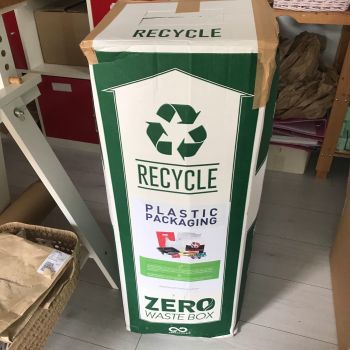
-
Research your local recycling facilities (non curbside) as some will take things like sweet and biscuit wrappers. We have a kind neighbour who collects these items for our street and takes to the local recycling centre. Recycle Now is a useful resource for finding out what is available in your postcode. Check that you are fully utilising your curbside facilities too - things like glass jars with lids, and paper envelopes with plastic windows can be placed into your curbside recycling box.
-
Sharing is Caring! Netherlands are now looking at a model for the future where even things like cars are shared, this may be the way forward for us to reduce our consumption. Share purchases or look out for a borrowing library near you - repair workshops are also starting to pop up around the country, so that we can make do and mend rather than buy new.
-
Donate unwanted household items rather than sending to landfill - either via a local charity, on your street chat, or via https://reuse-network.org.uk/ who give the items to the people most in need of them. 'We are ‘Working with our network of members, we are reducing poverty, tackling waste and offering a brighter and better future for the most isolated individuals in our society.’
-
Donate old paint - I always wince when I think about all the paint and associated paraphernalia that goes into landfill after a paint job. You can donate leftover paint to https://communityrepaint.org.uk/i-have-leftover-paint/give-leftover-paint-new-life/ (usually your local recycling centre) or consider offering to local community centres, whether for youth or the elderly.
By the time you have done all of these things, your bin bag, and conscience, should feel light as a feather! Do add your own tips and resources below.
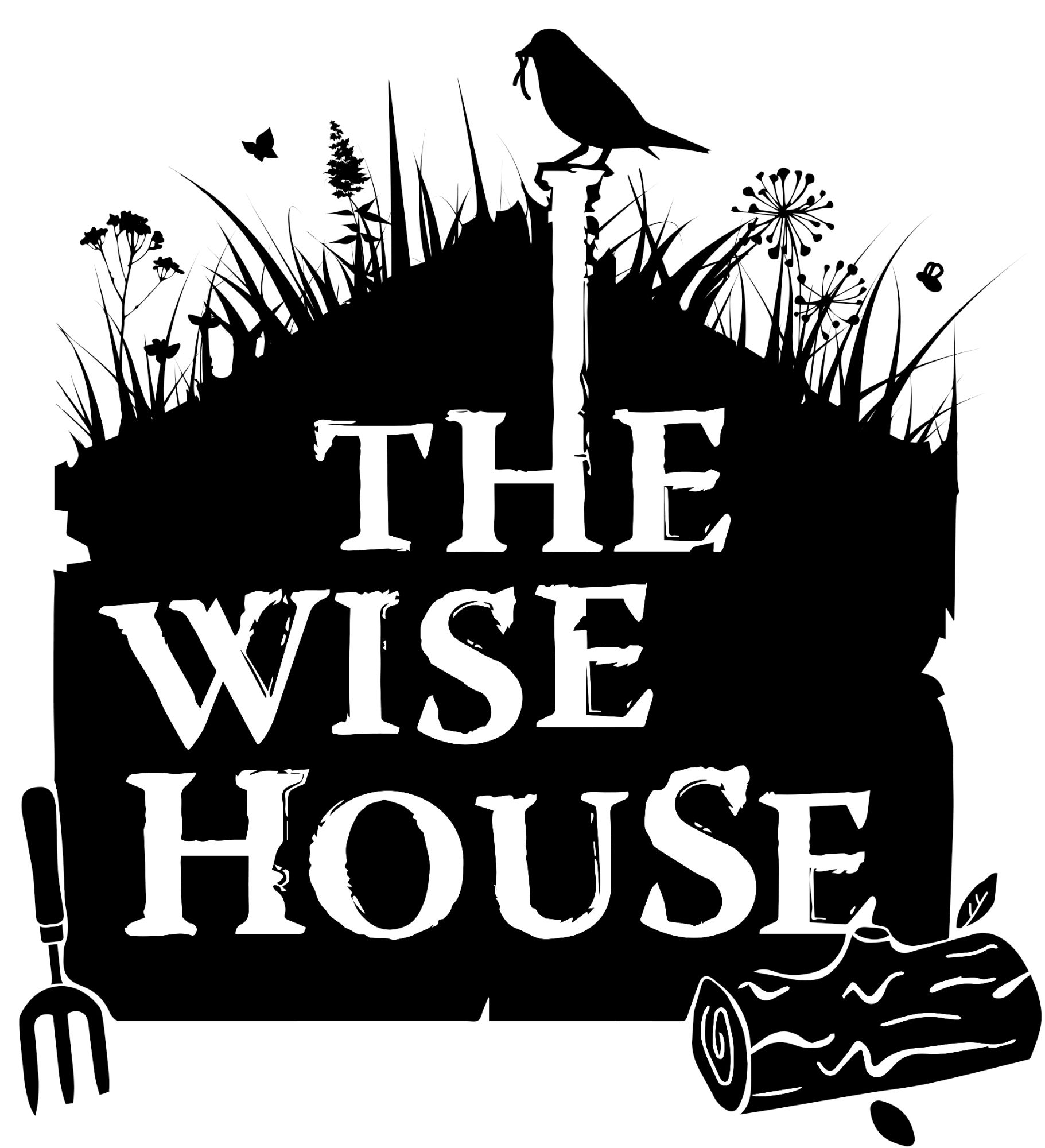
Add a comment: